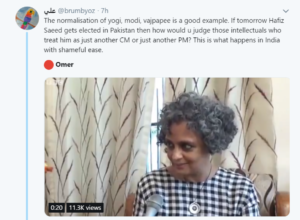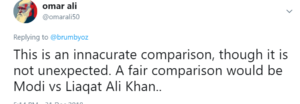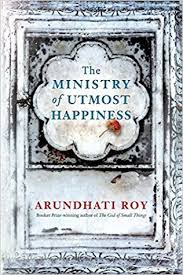Someone on Twitter posted a video of Arundhati Roy speaking out against Indian liberals who have “normalized” Narendra Modi by treating him as just another PM or CM.

The tweeter is an Indian Muslim (who, as far as I can tell, now lives in Australia) and I assume that he regards Modi, Yogi and Vajpayee as Hindu Nationalists who are out to make India a “Hindu Pakistan”, where minorities (especially Muslims) will be second class citizens who will fear for their life and live under humiliating and unfair restrictions. Let us assume this is true (that the BJP is a Hindu Nationalist party with exactly such ambitions), then liberals who “normalize” this party and its leaders are indeed guilty of betraying liberal principles. But even if that is true (and to some extent it surely is; we can debate to what extent), there can be several objections to this tweet, especially to the fact that ALL THREE are being compared to Hafiz Saeed. I raised this particular objection in the following tweet:

I will be the first to admit that this was mildly trollish, since I am well aware of the fact that the “done thing” is to make such judgments in terms of “local standards”.. by Pakistani standards, Hafiz Saeed is a religious extremist and a terrorist. So when Brumby wants an unflattering comparison for Modi, he picked Hafiz Saeed. On the other hand, Liaquat Ali Khan (first prime minister of Pakistan) is a Pakistani moderate. But my point was precisely this: the two standards are NOT the same. What Modi (or Yogi, or Vajpayee) may want is what Liaqat Ali Khan and Jinnah demanded and already got (thanks to some timely British help): an Islamic state, with discriminatory rules and laws that privilege one religion over all others. In that sense, Jinnah and the Muslim League leadership are indeed the correct comparison for a Hindu nationalist party.
But people also have other objections in mind. One is that Modi was CM during the Gujrat riots, when around 2500 people (mostly Muslims) died in a well organized pogrom during which the state machinery either stood aside or actively cooperated with the killers. Surely Liaquat Ali Khan cannot be compared to such a person? but even this objection stands on shakier ground than people may imagine. Liaquat Ali Khan was prime minister of Pakistan during a period when there was near-total ethnic cleansing of Sikhs and Hindus in Punjab and Karachi. This was not simply one or two spontaneous riots; there were well organized pogroms and the state machinery mostly stood aside (as in Gujrat, there were exceptions) and there is at least SOME evidence that Liaqat Ali Khan wanted them to stand aside because he did not really object to this cleansing (at a minimum he considered it the natural response to what was happening to Muslims in many parts of India). You can read more about this aspect here, but I will just post a paragraph from that newspaper article:
The above facts made me write that the violence against Sindhi Hindus and their mass migration to India was a tragic loss scripted, orchestrated and implemented by non-Sindhis in Sindh. I will happily withdraw my claim when furnished with the evidence to the contrary.
Published in The Express Tribune, June 5th, 2012.
The final objection I heard to my tweet was that Modi is an illiterate rabble rouser while Liaquat was the highly educated Westminster type. While it is true that Liaquat Ali Khan came from a rich feudal family (his grandfather, the nawab of Karnal was boss of 300 villages and had been given many honors because of his support of the British during the Indian Mutiny of 1857) and was educated in Oxford, he was never as thoroughly English as Jinnahbhoy, and neither is Modi as illiterate as his opponents make him out to be. That said, this objection has does have a little truth to it. My defense is that I was not saying they are exactly alike, I was only saying that as far as comparing BJP leaders to Pakistani politicians goes, the correct comparison is “any Muslim League leader” and not Hafiz Saeed.
I understand that many readers will find this comparison (BJP to Muslim league) hard to digest, but that is the point; it is hard to digest because it is unfamiliar. TIME magazine would not make this comparison and they have conventional wisdom on their side. But then again, we are not TIME magazine 🙂
PS: Arundhati, who admires Lenin (and Mao) has far to go before she can sit in judgment on liberals who “normalize” violent leaders.. If nothing else, we can all agree on that (see my article on Arundhati and her ilk here)
PPS: For details about partition violence (and later episodes of mass killings in Pakistan), see here..
